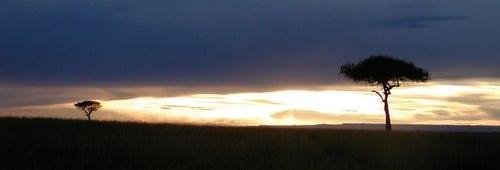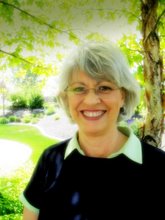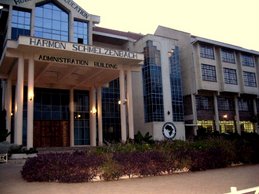
Wow--alot has happened since our last entry, which may be why it's taken so long to get it out to you. Before we go further, we need to say AGAIN--thank you, thank you, thank you for your e-mails, prayers, occasional letters and other indications of support for us and for the work at Africa Nazarene University. This only works if we are "global partners"--working together, praying for each other and for the good of the Kingdom.
...>GRADUATION
.We held our 11th graduation on Friday May 29th (Nan and Mark with several good-lookin' graduates and the University mace above). The graduation set several records.
 First, we graduated a record 210 students in 7 undergraduate disciplines and 2 graduate degrees: the Master of Arts in Religion and the Masters of Business Administration.
First, we graduated a record 210 students in 7 undergraduate disciplines and 2 graduate degrees: the Master of Arts in Religion and the Masters of Business Administration.
- Second, for the first time we held graduation in our new 3000+ seat Helstrom Student Centre (picture at left of academic procession moving toward the Centre). Dr. Ron Benefiel, President of Nazarene Theological Seminary, preached a powerful graduation message about the importance of reconciliation in a broken world.
- Mark was designated to lead the academic procession and carry the very impressive (and
 probably 35 pound!) University Mace. Enterprising Kenyan photographers come uninvited to take pictures of public events and try to sell the pictures to attendees. Mark had to have University security help keep the 30+ photographers out of the path of the procession as it moved across the campus and toward the Centre.
probably 35 pound!) University Mace. Enterprising Kenyan photographers come uninvited to take pictures of public events and try to sell the pictures to attendees. Mark had to have University security help keep the 30+ photographers out of the path of the procession as it moved across the campus and toward the Centre.
- Nan marched in the faculty procession and took all of the graduation pictures you see here. She is teaching "Christian Beliefs" to over a hundred(!) students and volunteered her class so the platform party could "practice" some new graduation procedures.
- There were several features of the ANU graduation that we didn't have in last year's
 graduation at NNU, our previous institution. One of them was the presence of a Maasai Choir and Dancers you see to the left. ANU has a special relationship with the church to which these Maasai belong and has hired some of its members and is currently working on scholarship opportunities for some of the Maasai young people.
graduation at NNU, our previous institution. One of them was the presence of a Maasai Choir and Dancers you see to the left. ANU has a special relationship with the church to which these Maasai belong and has hired some of its members and is currently working on scholarship opportunities for some of the Maasai young people.
- On Sunday afternoon Dr. Jerry Lambert, the new University Chancellor, led a pre-planning session for an important meeting next April about the direction of theological education in Africa. The group, including Vice Chancellor Leah Marangu, Regional Director Dr. Eugenio Duarte; Regional Education Coordinator Fili Chambo; Dr. Benefiel, Dr. Ted Esselstyn and Mark, met to begin planning. SPACEPACE
...>
.JPG) MERU "ROAD TRIP"
MERU "ROAD TRIP"On Wednesday, the brother of Dr. Raphael Kiugu, Mark's assistant, passed away of a massive heart attack. On Friday, Mark drove with Mr. Raphael Wanjohi (in his classic Peugot 504 Sedan), Mr. John Opiyo (the finance officer), Mr. Paul Kang'ori (the Dean of Students), and Mr. Timothy Kihiko (the Registrar), to the funeral just outside of Meru east of Mt. Kenya (picture to the left is of the mourners gathered around the grave site in a banana grove belonging to the man who passed away).
.This is the second of these trips Mark has taken to a funeral up in the mountains north of Nairobi. Each time it's an
.JPG)
education and a special privilege to listen to these men talk about their childhoods, their observations about Kenyan politics, their thoughts about faith and marriage and a hundred other topics.
One of the common mistakes missionaries made in the past and (please Lord) are trying not to make now, is failing to
listen and failing to be
student as well as teacher. Mr. Wanjohi (to the far right in this picture) has an undergraduate degree from the US and in spite of encountering some racism as a student in North Carolina in the 1960's, has a deep appreciation for his American education and his American experience. He's been an especially helpful guide for Mark to Kenyan customs and politics. Professor Marangu's brother Cornelius (a very successful businessman in the hat) had employed the man who passed away and after the funeral served as our guide to the Meru area. Mark and Nan are both so much richer for the interactions we are having with bright, thoughtful, capable African Christians at ANU and beyond.
...A STUDENT TO PRAY ABOUT.In our standard deputation message last fall, we talked about a student named Florence who

came to ANU for one term, had to leave because of finances, and then came back because 100 people in her village and church had given money to support her return--a wonderful, inspiring story. Do those of you who heard our deputation message remember that story? Well to the right and below...HEEERE's FLORENCE!
.The good news is that Florence is faithful and courageous and hopeful--the kind of young woman you'd like to have for a daughter or member of your Sunday school class or a friend to one of your own children. She's at ANU now taking classes and has

already received half of this trimester's tuition and fees from a wonderful, faithful correspondent and blog reader in Indiana, herself struggling with some health issues. The bad news is that her village has given all it can and that Florence needs help to complete the five trimesters she has left in her undergraduate requirements.
.In her testimony, Florence explains how God has been faithful to her through the support of her church, small government grants, and the love and goodwill of the people at ANU. She writes,
"...the role that my church played in my education has remained a challenge to
me. It is the prayer of my soul that God willing I go back and appreciate the
community and church. I have a vision of computerizing all church activities and
starting an IT school for my church."
Such a school would allow other students from her community to gain skills and advance themselves and their families. We're not worried about this young woman. We have seen God's faithfulness through his church and his people. If you have a particular ministry in your church or your community that you're supporting, we praise the Lord for that and you shouldn't fret about Florence.
.If you feel a tugging about this young woman, though, we'd encourage you to get in contact with us so we can connect you with her. We're help Florence a bit ourselves, and at the end of the day it doesn't feel like a we're doing her a favor. It feels like a privilege to use some of God's blessings to
us to help change a life and a small, rural community in Africa.
...PRAYER REQUESTS.Thanks for your continued prayers. We wouldn't say we don't need them AT ALL ourselves, but we're doing fine and we'd really ask you, as you think to pray, to keep these requests for others primarily in mind:
- Please pray for our young pastoral students at ANU. They are far from home. They don't have alot of money. They struggle as all students do with grades and making friends. Please keep them in your prayers.
- Pray for this meeting in April about theological education in Africa. Pray that God will break into our conversations and just TAKE CHARGE in a way that is clear to everyone.
- Pray for Verna Stanton, longtime Nazarene missionary who lost her father over the weekend and has returned to the US to attend the funeral.
- Please pray for the Nazarene church in Kenya. Some churches were split apart by the tribal violence early in the year. Healing is happening, but slowly. Please pray that God will guide pastors and district superintendents, and that the church will be a model Christian community that can spread to the nation of Kenya.
- Please pray for Mark's dad and mom. Mark's mom broke her hip several weeks ago and although she is in rehab will probably never return to the home. This is difficult for her and for Mark's dad who has been a model care-giver.
Thanks to each of you for your communication and faithfulness. We love you all. We have received word of a Nampa First Church team coming somewhere in Kenya and we hope to see you all while you're here. In the meantime, please let us know if there are ways we can be praying for any of you. We want this to be a true partnership, and would love to join you in prayer for issues in your lives.>
.
.
FUN PICTURE COLLECTION
.
.
.JPG) Sometimes we just see things that tickle our funny-bones or make us think or that we believe you'd like seeing. Kenyans are deeply exposed to Christian ideas. Sometimes--as in the USA we would hurry to say--these ideas and themes are deeply held and life-changing (see Florence above). Sometimes, they are seen as a kind of good luck charm for a business enterprise.
Sometimes we just see things that tickle our funny-bones or make us think or that we believe you'd like seeing. Kenyans are deeply exposed to Christian ideas. Sometimes--as in the USA we would hurry to say--these ideas and themes are deeply held and life-changing (see Florence above). Sometimes, they are seen as a kind of good luck charm for a business enterprise.
We've already written about our affection for ancient Kenyan trucks--particularly the Isuzu F-series. Here's an especially decrepit truck with an especially relevant message across the top of its windshield. If you look closely you can see it reads: "All Things Are Possible In Jesus Name"--the fact that it's on a truck windshield doesn't keep it from being absolutely true--hallelujah anyway!.JPG)
.
.
On the other hand, the bereaved family had hired a bus to bring visitors from Nairobi to the funeral. Mark and the men in the Peugeot gathered with others to drink sodas at a shady site as they waited for all attendees to arrive. Across the red dirt road, this business caught Mark's eye. We'll leave it to you to try to decide why the business owner decided on this name. We're fresh out of credible religious applications :-).
.
.
Well, that's it for now, but..."more later."
.JPG)
.jpg)
.JPG)
.JPG)



.jpg) This past Saturday evening, while Nan stayed home and graded papers, Mark and ANU Chancellor Jerry Lambert accepted an invitation from a professor at the University of Nairobi to attend his temple's annual Duwali Festival--Christmas and New Year's wrapped up in one for the Hindu community. As it turned out, the evening was very interesting but also very moving. The temple itself looked like a modern secondary school with a gym and a nice park-like lawn in the back.
This past Saturday evening, while Nan stayed home and graded papers, Mark and ANU Chancellor Jerry Lambert accepted an invitation from a professor at the University of Nairobi to attend his temple's annual Duwali Festival--Christmas and New Year's wrapped up in one for the Hindu community. As it turned out, the evening was very interesting but also very moving. The temple itself looked like a modern secondary school with a gym and a nice park-like lawn in the back..jpg)
.jpg)
.jpg) speaker was saying or the singer was singing: "When the sun goes down, a little candle gives great light." "The greatest success is the greatest humility." "Nobility of spirit is God's wish for his people." Not everything was serious. There was a Hindi comedian telling corny and familiar jokes: a man who said his newborn twins should be named "Pete" and "Repeat." A man advised to have his daughter eat an apple daily to avoid the advances of an undesirable doctor because "Everyone knows an apple
speaker was saying or the singer was singing: "When the sun goes down, a little candle gives great light." "The greatest success is the greatest humility." "Nobility of spirit is God's wish for his people." Not everything was serious. There was a Hindi comedian telling corny and familiar jokes: a man who said his newborn twins should be named "Pete" and "Repeat." A man advised to have his daughter eat an apple daily to avoid the advances of an undesirable doctor because "Everyone knows an apple .jpg)
 happen on the road." Epaphras, one of the ANU drivers, and Mark were headed toward Kenyatta International Airport about 7PM last Sunday evening in ANU's venerable Mitsubishi Pajero to pick up Dr. Jerry Lambert, our new chancellor; Dr. Tom Parks, dean of the MVNU School of Business and his son Thomas. Traffic was heavy. For those of you who've been here, remember the "rough dip" just after you've left Bomas and before you get to Nairobi National Park? As they started up the hill traffic was fairly light on our side of the road and heavy on the other side. So far, so good.
happen on the road." Epaphras, one of the ANU drivers, and Mark were headed toward Kenyatta International Airport about 7PM last Sunday evening in ANU's venerable Mitsubishi Pajero to pick up Dr. Jerry Lambert, our new chancellor; Dr. Tom Parks, dean of the MVNU School of Business and his son Thomas. Traffic was heavy. For those of you who've been here, remember the "rough dip" just after you've left Bomas and before you get to Nairobi National Park? As they started up the hill traffic was fairly light on our side of the road and heavy on the other side. So far, so good. .JPG)
+(Medium).JPG) : One of the things we're having to learn is that, while the climate here is one of the best in the world, the seasons are more subtle and BACKWARD from seasons in the US. All that to say--as you move into autumn and prepare for winter, we are moving into spring and preparing for summer. We continue to enjoy our cozy home, and although you can't see it, we often lit a set of candles in our fireplace which did a passable job of taking the chill
: One of the things we're having to learn is that, while the climate here is one of the best in the world, the seasons are more subtle and BACKWARD from seasons in the US. All that to say--as you move into autumn and prepare for winter, we are moving into spring and preparing for summer. We continue to enjoy our cozy home, and although you can't see it, we often lit a set of candles in our fireplace which did a passable job of taking the chill .JPG)
.JPG)
.JPG)
.JPG)
.JPG)
.JPG)
.JPG)
.JPG)
.JPG)
.JPG) After a good breakfast and four more hours of travel, the train finally pulled into the Mombasa train station at 11AM--SIXTEEN HOURS after we had left Nairobi. A driver we had arranged for picked us up and took us to our hotel--a kind of faded resort directly on the Indian Ocean. We mainly crashed the rest of the afternoon, but took a walk on the beach in the evening and then spent the next day exploring Mombasa. It's famous for the ancient doors on several of the buildings in the old city. More pictures follow.
After a good breakfast and four more hours of travel, the train finally pulled into the Mombasa train station at 11AM--SIXTEEN HOURS after we had left Nairobi. A driver we had arranged for picked us up and took us to our hotel--a kind of faded resort directly on the Indian Ocean. We mainly crashed the rest of the afternoon, but took a walk on the beach in the evening and then spent the next day exploring Mombasa. It's famous for the ancient doors on several of the buildings in the old city. More pictures follow..JPG)
.JPG)
.JPG)
.JPG)
.JPG)
.JPG) Bob and Kim Cantrell from our home church in Nampa are coming in a week and planning to spend part of their time in Mombasa. These are some of the things they will see, and if you come, these are some of the things you will see as well. At the risk of "spiritualizing" things (we're glad to take the risk), the Muslim movement is on the march in Africa. There are many mosques--large and small--in Nairobi and the overwhelming number of places of worship in Mombasa are mosques. We'd ask you to pray for the Nazarene churches and for other Christian churches in the Mombasa area, that God will move in a mighty way and that people will understand the transforming Good News of the gospel.
Bob and Kim Cantrell from our home church in Nampa are coming in a week and planning to spend part of their time in Mombasa. These are some of the things they will see, and if you come, these are some of the things you will see as well. At the risk of "spiritualizing" things (we're glad to take the risk), the Muslim movement is on the march in Africa. There are many mosques--large and small--in Nairobi and the overwhelming number of places of worship in Mombasa are mosques. We'd ask you to pray for the Nazarene churches and for other Christian churches in the Mombasa area, that God will move in a mighty way and that people will understand the transforming Good News of the gospel..JPG)
.JPG)
.JPG)
+(2).JPG)
.JPG)
.JPG)
.JPG)
.JPG)
.JPG)
.JPG)
 Wow--alot has happened since our last entry, which may be why it's taken so long to get it out to you. Before we go further, we need to say AGAIN--thank you, thank you, thank you for your e-mails, prayers, occasional letters and other indications of support for us and for the work at Africa Nazarene University. This only works if we are "global partners"--working together, praying for each other and for the good of the Kingdom.
Wow--alot has happened since our last entry, which may be why it's taken so long to get it out to you. Before we go further, we need to say AGAIN--thank you, thank you, thank you for your e-mails, prayers, occasional letters and other indications of support for us and for the work at Africa Nazarene University. This only works if we are "global partners"--working together, praying for each other and for the good of the Kingdom.


.JPG)
.JPG)


.JPG)
.JPG)



